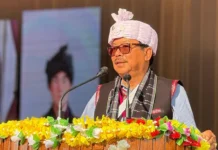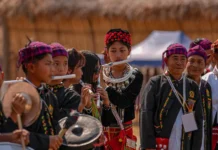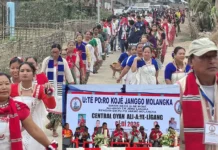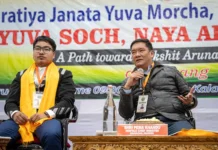Arunachal Pradesh is a weird cross of old shrill Hindi songs and the latest, colourfully vibrant K-pop videos.
But one thing that has not changed and has remained staunch in its stand is the outlook of the localstowards the LGBT community. Here, the LBGTs are still seen as a social anomaly, and ignorance and discrimination in the society is rampant.
Finding a homophobe in Arunachal will prove to be a very easy task. All you have to do is speak to the person next to you, and voila.
One person who faced a lot of hatred towards her was E. She faced plenty of discrimination and bullying in school because she was an open lesbian.
A lot of comments and rumours were spread, and she says that the main reason why it was done was because of religion and the society.
She says that in the Bible it is written that “Man shall not lay with man,” and a lot of people use this as an excuse to vent their anger on something that they do not understand.
“The same people that used to bully me in school are now supporters of the LGBT community,” she adds.”I think their perspectives changed because of exposure and education.”
Another LGBT member is K. K identifies as a transman.
K says he knew that though he was born in a female body, he realised from the age of five or six that he was a male.
He is hilariously confused about what to identify himself as, because he doesn’t identify himself as a female. So, though he is in a relationship with a girl, the term ‘lesbian’ would not be correct.
K says that his brothers and a close cousin are aware of how he identifies himself, and that they are very supportive. But he has yet to come out to his parents who think that K is simply “boyish”.
He is scared to tell them and currently has no intention of coming out to his parents. He says that he does not want to because he does not want them to worry about him and the criticisms that he will bear.
He says that he has not faced any outright discrimination because the people around him are very supportive. He does, however, include that when people find out about him, it becomes “hot news” for them.
L is another individual currently under going hormonal therapy to transition into a male.
He says that he was very distressed when he went through puberty and hated getting his periods. Luckily for him, he chuckles, he got his periods once in every two or three months and his breasts were on the smaller side, so they were easier to bind.
He says that till the age of 16 he tried conforming,under family pressure, to dress like a girl. Soon he gave that up and told his parents to not force him to wear feminine clothes.
He admits that he has not informed his parents about the regular hormone treatment, but he suspects his parents know that he is undergoing treatment because his voice is getting deeper.
Because he has not told his parents about his hormone treatment, he says that he pays for them himself because the treatment is done just twice a month for only Rs 300.
He says what his parents are most scared of is the surgery and its irreversibility. They are scared that he will regret it.
He is currently seeing a psychiatrist, and an endocrinologist, and has spoken to a surgeon.
Like K, most of the people L meets are supportive of him. His plans are not set in stone and he plans to “go with the flow,” though he does plan to settle in Arunachal Pradesh itself.
K’s future plans are more common when it comes to the LGBTs in India. He plans to earn enough money and settle abroad, and maybe even pay for a transition operation; but first he would need to makesure that there are no health issues, and only then would he proceed. He is, however, very sure about wanting to pay for it himself.
In India, being a gay person is a criminal offence under Section 377 of the Indian Penal Code, so most LGBT people have no protection under the law. This leaves them very vulnerable to be exploited or become victims of hate crimes. In Arunachal, these hate crimes are quite common.
LGBT members have been assaulted, called things like “You are an insult to humankind” and some go so far as to even ostracize them from their own families and cut all ties with them.
Yes, things are changing, but is it changing fast enough to save all the future hate crimes that will take place if nothing is done?
People need to be more open-minded and accepting,and they need to teach their children to be the same.(This article has been written by an intern of The Arunachal Times)




